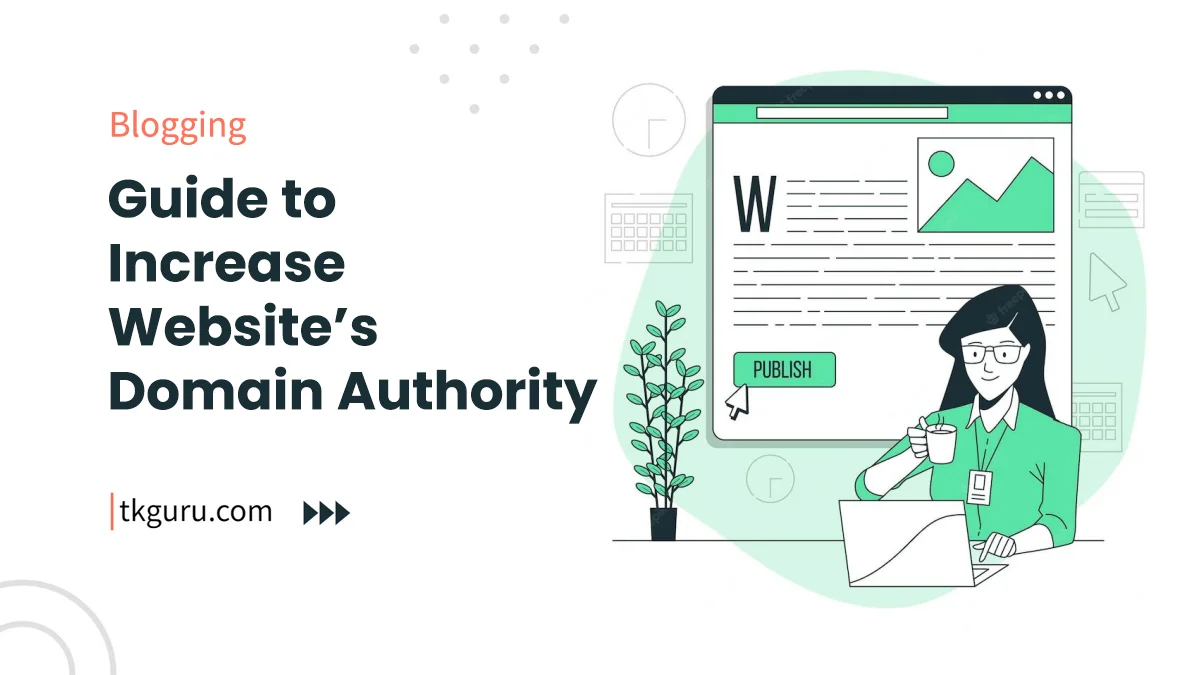Advertisements
Ratings

Increase Website Domain Authority 2024 – In the competitive landscape of online marketing, one metric stands out as a crucial indicator of a website’s credibility and potential for ranking high on search engine results pages (SERPs) – Domain Authority (DA).
Developed by Moz, Domain Authority is a relative metric that predicts a website’s likelihood to rank based on its link profile, content quality, and other factors.
In this comprehensive guide, we’ll explore actionable strategies to enhance your website’s Domain Authority and drive organic traffic to your digital doorstep.
Contents
- 1. Understanding Domain Authority
- 2. Comprehensive Keyword Research
- 3. High-Quality Link Building
- 4. On-Page SEO Optimization
- 5. Technical SEO Enhancements
- 6. User Experience and Site Design
- 7. Social Media Integration
- 8. Regular Content Updates
- 9. Monitoring and Analysis
- 10. Patience and Long-Term Strategy
- Conclusion
- Increase Website’s Domain Authority FAQs
1. Understanding Domain Authority
Before delving into strategies, it’s essential to grasp the concept of Domain Authority. This metric, ranging from 1 to 100, quantifies a website’s reputation and authority in its niche.
However, it’s crucial to note that DA is not an absolute measure but a comparative one, evaluating your site against others. Multiple factors influence DA, including:
- Link Profile: The quantity and quality of backlinks pointing to your site.
- Content Quality: The relevance, depth, and engagement level of your content.
- Site Structure: The ease of navigation and user experience on your site.
2. Comprehensive Keyword Research
Effective SEO begins with targeted keyword research. Understanding what your audience is searching for helps you create content that addresses their needs.
Use keyword research tools to identify relevant and high-volume keywords in your niche. These keywords will serve as the foundation for your content creation efforts.
When crafting content around these keywords, prioritize quality over quantity. High-quality, informative, and engaging content naturally attracts backlinks, which contribute to increasing your Domain Authority.
3. High-Quality Link Building
Link building remains a cornerstone of SEO. It’s not just about the number of backlinks, but the quality and relevance of those links. Focus on ethical and effective link-building strategies:
- Guest Posting: Contribute high-quality content to authoritative websites in your niche. Ensure that your guest posts provide value to readers and include a relevant link back to your site.
- Influencer Collaboration: Collaborate with influencers and industry leaders. Their endorsement can lead to natural and authoritative backlinks.
- Partnerships: Build relationships with complementary businesses or organizations, leading to mutually beneficial link-building opportunities.
4. On-Page SEO Optimization
On-page SEO involves optimizing elements on your web pages for both search engines and users. Key on-page optimization tactics include:
- Meta Tags: Craft compelling title tags and meta descriptions that accurately represent your content.
- Headers: Use headers (H1, H2, etc.) to structure your content and make it more scannable for readers and search engines.
- Images: Optimize images by using descriptive alt text and appropriately compressing them for faster loading times.
- Content Structure: Organize your content logically with subheadings and bullet points to enhance readability.
- User Experience: Prioritize user experience by ensuring fast page load times and mobile responsiveness.
5. Technical SEO Enhancements
Technical SEO focuses on the behind-the-scenes aspects of your website that affect its visibility and performance on search engines. Consider the following technical enhancements:
- Website Security: Ensure your site is served over HTTPS, indicating a secure connection to users and search engines.
- Mobile-Friendliness: Optimize your site for mobile devices, as Google considers mobile-friendliness a ranking factor.
- Structured Data Markup: Implement structured data markup to enhance the appearance of your search results with rich snippets.
6. User Experience and Site Design
User experience (UX) plays a significant role in both user engagement and search engine rankings. An intuitive and enjoyable user experience encourages visitors to stay on your site and explore further. To enhance UX:
- Navigation: Ensure your site’s navigation is intuitive, making it easy for users to find what they’re looking for.
- Calls to Action: Include clear and compelling calls to action (CTAs) that guide users toward desired actions.
- Design: Adopt a clean and minimalistic design that supports readability and visual appeal.
- Bounce Rates: Monitor and address high bounce rates by improving the relevance and engagement of your content.
7. Social Media Integration
Social media platforms offer an excellent opportunity to increase brand visibility and drive traffic.
Integrate social sharing buttons on your content to encourage users to share it on their networks. This can lead to more backlinks and a wider reach for your content.
Engage with your audience on social media platforms by responding to comments, sharing relevant content, and participating in discussions. This interaction can further boost your website’s credibility and authority.
8. Regular Content Updates
Search engines favor websites that consistently provide fresh and valuable content. Develop a content calendar to ensure a steady stream of new content.
Additionally, revisit and update older content to keep it relevant and accurate. Repurposing existing content into different formats can also extend its lifespan and reach.
9. Monitoring and Analysis
To track your progress in increasing Domain Authority, utilize tools that offer insights into your backlink profile, organic traffic, and other key metrics.
Regularly analyze the performance of your link-building efforts, content strategy, and technical optimizations.
Identify and disavow toxic or low-quality backlinks that could potentially harm your Domain Authority and search engine rankings. Make data-driven adjustments to your strategies based on the results you observe.
10. Patience and Long-Term Strategy
Boosting Domain Authority requires patience and a long-term approach. Avoid shortcuts and black hat techniques that promise quick results but can damage your site’s credibility in the long run.
Instead, focus on sustainable strategies that lead to gradual and consistent growth in both Domain Authority and organic traffic.
Conclusion
In the competitive realm of online visibility, a higher Domain Authority can set your website apart and attract valuable organic traffic.
By understanding the nuances of Domain Authority and implementing a well-rounded approach encompassing keyword research, link building, on-page and technical SEO, user experience enhancements, and consistent content updates, you’ll be well on your way to building a website with a strong online presence.
Remember, it’s not just about the numbers; it’s about delivering value and establishing credibility in your niche. Stay dedicated, stay informed, and watch your Domain Authority rise over time.
Increase Website’s Domain Authority FAQs
What is domain authority, and why is it important for a website?
Domain authority is a metric developed by Moz that reflects a website's credibility and authority in search engines. It's important because it can impact a site's search engine rankings. Higher domain authority often means better search visibility.
How can I improve my website's domain authority?
To improve domain authority, focus on creating high-quality, relevant content, earning quality backlinks from authoritative websites, optimizing on-page SEO, and ensuring a positive user experience. Regularly update your content and monitor your link profile.
Is there a specific numerical target for domain authority to aim for?
There's no specific target for domain authority, as it's a relative metric that varies by industry and competition. Instead, focus on improving your website's authority compared to your competitors within your niche.
Can I increase domain authority quickly, or is it a long-term effort?
Increasing domain authority is generally a long-term effort. It requires consistent, high-quality content creation, building a strong backlink profile over time, and demonstrating expertise in your niche. Quick fixes or shortcuts can be detrimental in the long run.
How can social media and branding contribute to domain authority?
Active social media engagement and strong branding can indirectly contribute to domain authority by increasing your website's visibility and attracting more backlinks and traffic. A reputable and recognized brand is often associated with higher authority.
| Web Hosting | Website |
| WordPress | Google Adsense |
| SEO | Affiliate Marketing |
| Blogging | YouTube |
Recent Posts:
- Windows vs Mac: Choosing the Ideal Laptop for Your Needs
- 10 Best Budget Friendly Laptops for Bloggers with Impressive Performance
- Top MacBook Models for Blogging Professionals
- 10 Best Laptops for Content Creators in 2023
Related Tags:






